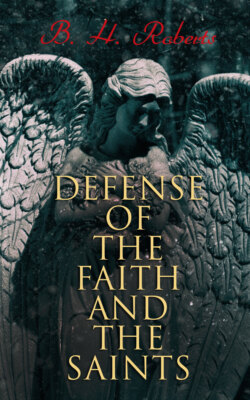Читать книгу Defense of the Faith and the Saints - B. H. Roberts - Страница 27
На сайте Литреса книга снята с продажи.
FOREWORD.
ОглавлениеTable of Contents
The following remarks were prepared for a Jefferson dinner, at the Commercial Club rooms in Salt Lake City, in April, 1907; and afterwards published in the Salt Lake Herald, of May 14th.
The question of the relations of church and state, or rather the question of the domination of the state by the church, was still agitated in Utah. The Mormon Church at its Annual Conference in April of the above year had issued an "Address to the World" in which its attitude on the question was once more stated, and stated with greater clearness and emphasis than ever before.
It was in the expectation that some reference would be made to this local question that the subject of the following address was selected. In order that the attitude of the Mormon Church with reference to the relations of the church and the state may be present to the readers' mind, while considering the following paper. I quote that part of the aforesaid Address upon the subject:
"In answer to the charge of disloyalty, founded upon alleged secret obligations against our government, we declare to all men that there is nothing treasonable or disloyal in any ordinance, ceremony, or ritual of the Church.
"The overthrow of earthly governments; the union of church and state; domination of the state by the church; ecclesiastical interference with the political freedom and rights of the citizen—all such things are contrary to the principles and policy of the Church, and directly at variance with the oft-repeated declarations of its chief presiding authorities and of the Church itself, speaking through its general conferences. The doctrine of the Church on the subject of government, stands as follows:
"We believe in being subject to kings, presidents, rulers and magistrates, in obeying, honoring and sustaining the law."
Such is our acknowledgement of duty to civil governments. Again:
"We believe that all governments necessarily require civil officers and magistrates to enforce the laws of the same, and that such as will administer law in equity and justice should be sought for and upheld by the voice of the people (if a republic), or the will of the sovereign.
"We do not believe it just to mingle religious influence with civil government; whereby one religious society is fostered and another proscribed in its spiritual privileges, and the individual rights of its members, as citizens, denied."
With reference to the laws of the Church, it is expressly said:
"Be subject to the powers that be until he comes whose right it is to reign, and subdues all enemies under his feet.
"'Behold, the laws which ye have received from my hand are the laws of the Church, and in this light ye shall hold them forth."
That is to say, no law or rule enacted, or revelation received by the Church, has been promulgated for the State. Such laws and revelations as have been given are solely for the government of the Church.
The Church of Jesus Christ of Latter-day Saints holds to the doctrine of the separation of church and state; the non-interference of church authority in political matters; and the absolute freedom and independence of the individual in the performance of his political duties. If, at any time, there has been conduct at variance with this doctrine, it has been in violation of the well settled principles and policy of the Church.
We declare that from principle and policy, we favor:
The absolute separation of church and state;
No domination of the state by the church;
No church interference with the functions of the state;
No state interference with the functions of the church, or with the free exercise of religion;
The absolute freedom of the individual from the domination of ecclesiastical authority in political affairs;
The equality of all churches before the law.
The reaffirmation of this doctrine and policy, however, is predicated upon the express understanding that politics in the states where our people reside, shall be conducted as in other parts of the Union; that there shall be no interference by the State with the Church, nor with the free exercise of religion. Should political parties make war upon the Church, or menace the civil, political, or religious rights of its members as such—against a policy of that kind, by any political party of set of men whatsoever, we assert the inherent right of self-preservation for the Church, and her right and duty to call upon her children, and upon all who love justice, and desire the perpetuation of religious liberty, to come to her aid, to stand with her until the danger shall have passed. And this, openly, submitting the justice of our cause to the enlightened judgement of our fellow men, should such an issue unhappily arise. We desire to live in peace and confidence with our fellow citizens of all political parties and of all religions.
